Why Is Cold Water Bad For You? Cold water’s impact on the body is a topic of much discussion. WHY.EDU.VN delves into the science-backed facts, addressing potential risks and surprising benefits for different individuals. Explore how cold water interacts with your system and discover balanced insights, providing you with a comprehensive understanding of its effects. Understand its influence on wellness, health conditions, and hydration strategies.
1. Examining the Potential Risks and Disadvantages of Drinking Cold Water
Drinking cold water isn’t inherently harmful, but some potential risks and disadvantages are worth considering. These can include a temporary thickening of nasal mucus, headaches in susceptible individuals, heightened tooth sensitivity, slowed gastric emptying, and potential aggravation of achalasia, a condition that affects the esophagus. In rare cases, it could contribute to “cold stress” when the body struggles to maintain its core temperature.
Here’s a closer look at the research:
- Nasal Mucus Thickening: A 1978 study published in the journal CHEST revealed that nasal mucus thickened for over 30 minutes after drinking cold water.
- Headaches: A 2001 study by P. Mattson indicated that 7.6% of women experienced headaches after consuming 150ml of ice-cold water.
- Tooth Sensitivity: Experts at the McCarl Dental Group highlight that some individuals report sharp pain or lingering discomfort after exposure to cold beverages.
- Gastric Motility: A 2020 study at Waseda University in Japan found that consuming water at 2°C slowed gastric contractions compared to warmer water.
- Achalasia: Research by Yutang Ren and colleagues suggests that drinking cold water at 2°C could worsen achalasia symptoms like difficulty swallowing and chest pain.
- Problems During Heat Exhaustion: Dr. David Schultz cautions that cold water during heat exhaustion could activate the vagus nerves, potentially leading to loss of consciousness.
- Immune System Weakening: Dr. Pallavi Suyog Uttekar suggests that, in extreme situations, cold water could lead to “cold stress,” narrowing blood vessels in the throat and potentially reducing the body’s ability to fight off viruses and bacteria.
2. Pinpointing Which Body Parts Can Be Affected by Cold Water Consumption
Drinking cold water can potentially influence several parts of your body, including your teeth, heart, blood pressure, throat and respiratory system, brain and nervous system, stomach and digestive system, and even your immune system. However, the extent and significance of these effects can vary.
Let’s delve into the research:
- Teeth: Dr. Robert H. DeWitt explains that tooth sensitivity to cold water often stems from pre-existing conditions that expose sensitive nerves.
- Heart: Research from Taiwan’s National Yang-Ming University School of Medicine indicated that drinking ice water lowered heart rates compared to room temperature water. A study at Switzerland’s University of Fribourg Department of Medicine found that ingestion of cold water reduced the workload to the heart by approximately 4.8 beats per minute.
- Blood Pressure: A 2013 study from China’s Second Affiliated Hospital of Nanchang University found that drinking cold water (4°C) led to a temporary rise in blood pressure in healthy students. Satoshi Kubota notes that cold water can constrict blood vessels, potentially raising blood pressure.
- Throat and Respiratory System: K Saketkhoo et al. demonstrated that cold water can lead to thicker mucus, potentially causing respiratory distress.
- Esophagus: A 2012 study by the Chinese Academy of Medical Science linked cold water to swallowing difficulties, chest pain, and other esophageal motility disorders.
- Brain and Nervous System: Dr. P. Mattson’s research indicates that cold water can trigger sudden headaches. Dr. David Schultz warns that during heat exhaustion, it could lead to a nervous system response and loss of consciousness.
- Stomach and Digestive System: Studies suggest that cold water can potentially worsen achalasia symptoms and cause issues with food moving out of the stomach.
- Immune System: In extreme cold and wet conditions, drinking cold water might contribute to “cold stress,” reducing immune responses and temporarily lowering white blood cell counts.
2.1. Decoding Why Your Teeth Sometimes Hurt When You Drink Cold Water
The sharp or dull pain you experience when drinking cold water often stems from underlying dental issues that have compromised your tooth enamel and exposed sensitive nerves.
Experts at Crest, a Procter and Gamble dental product company, explain that enamel loss exposes dentinal tubules, which are canals leading to the nerves. When these tubules are stimulated by cold water, they transmit the sensation to the nerves, resulting in pain.
According to Robert H. DeWitt, tooth sensitivity can also arise from aggressive brushing, teeth grinding, abrasive toothpastes, gum disease, plaque buildup, cracked teeth, or decaying fillings. These factors can erode the protective enamel, making your teeth more vulnerable to temperature changes.
3. Exploring the Benefits of Drinking Cold Water on Your Health
Drinking cold water can be surprisingly beneficial, offering advantages like a potentially improved metabolism rate, boosted weight loss efforts, enhanced hydration during exercise, and increased alertness.
Here’s what the research and experts say:
- Increased Metabolism: A 2003 study by Dr. Michael Boschmann found that drinking cooler water (22°C) resulted in greater energy expenditure compared to warmer water (37°C). This is because your body works harder to warm the water to body temperature, potentially boosting metabolism.
- Boosted Weight Loss: G Dubnov-Raz and colleagues found that in overweight children, drinking cold water (4°C) increased resting energy expenditure. Consistent daily consumption could potentially lead to a weight loss equivalent of 1.2 kg per year.
- Improved Hydration for Exercise: Research by Saeed Khamnei and others suggests that cool water (16°C) is optimal for exercising in the heat, helping maintain a low core temperature and minimizing sweating. Performance in exercise tests also improved.
- Increased Alertness: According to Foothills Sports Medicine Physical Therapy, cold water can help stimulate adrenaline production, potentially making you feel more alert without the side effects of caffeinated drinks.
3.1. Is Drinking Cold Water An Effective Way to Lose Weight?
Yes, drinking cold water can be a helpful component of a weight loss strategy. It may boost your metabolism, contribute to a feeling of fullness, and improve your performance during exercise.
Research supports these claims:
- The 2003 Humboldt-University study found that drinking lower-temperature water led to a greater expenditure of energy and a better metabolism rate as the body works to warm the water, increasing calorie burn.
- Professor Brenda M. Davy’s study at Virginia Tech found that drinking water before a meal made participants feel fuller and reduced calorie consumption during the meal.
- Studies show that cooler water acts as a heat sink to reduce core temperature.
- The Heat Research Division of the U.S. Army Research Institute of Environmental Medicine found that cool water at 15°C during exercise creates a cyclical drinking pattern, so people tend to hydrate effectively which may result in an improved weight loss regimen.
3.2. Can Drinking Cold Water Positively Impact High Blood Pressure?
No, drinking cold water is not generally recommended for high blood pressure. Limited research suggests it might lead to a temporary rise in blood pressure by constricting blood vessels.
Satoshi Kubota found that cold water constricts blood vessels, which prevents blood from going to the extremities and raises blood pressure. A 2013 study by Jianyong Ma found that drinking cold water led to a temporary increase in diastolic blood pressure (the denominator reading) for 22 minutes in healthy students.
It’s worth noting that the Red Cross suggests that people who have donated blood drink water to raise blood pressure to prevent fainting. However, their research suggests that cold or room temperature water would have an equivalent effect in raising the blood pressure of low blood pressure patients.
4. Identifying Who Should Consider Drinking Cold Water
While cold water isn’t for everyone, certain individuals may find it particularly beneficial. This includes athletes, overweight children, individuals with multiple sclerosis, and those with hypotension (low blood pressure). Of course, any healthy person who simply enjoys the refreshing feeling of cold water can also include it as part of their hydration routine.
Here’s why it’s helpful for these groups:
- Athletes: Brooke Schantz explains that cold water can help reduce the body’s core temperature during exercise, potentially improving performance. Research suggests that cold water ranging from -1°C to 16°C can be beneficial during exercise.
- Overweight Children: According to G Dubnov-Raz, cold water can create extra energy expenditure to warm it up, potentially aiding in weight loss.
- Multiple Sclerosis Patients: Georgia K Chaseling found that cold water ingestion improved exercise tolerance in patients with multiple sclerosis.
- Hypotension Patients: The Red Cross suggests drinking water to raise blood pressure among people who have donated blood to prevent fainting and in hypotensive patients (low blood pressure), as it can constrict blood vessels.
As a cautionary note, babies and the elderly may want to avoid cold water due to potentially weaker immune systems and susceptibility to “cold stress.”
According to Pallavi Suyog Uttekar, drinking cold water can lead to narrowing of blood vessels in the throat, reduction in the body’s ability to remove viruses and bacteria, and lower the white blood cells temporarily. It should also be avoided by those with dental sensitivity or achalasia.
5. Is It Safe For Pets to Drink Cold Water?
Yes, pets can safely drink cold water. Both dogs and cats often show a preference for it, which can help ensure they stay properly hydrated.
The Central Texas Veterinary Specialty & Emergency Hospital (CTVSEH) addresses the rumor that cold water can cause bloating. However, Dr. Tina Wismer from the ASPCA’s Animal Poison Control Center clarifies that dogs do not bloat from drinking ice water, and some experts even suggest it as a treat, particularly on hot days to prevent overheating.
A 2005 study found that over 60% of dogs preferred the coolest water option of 15°C (59°F).
Sure Petcare notes that cats sometimes prefer cold water, possibly because they perceive it as fresher. A 2018 study on cat drinking habits suggested that providing ice cubes or larger blocks of ice can encourage play, exploration, and potentially increase water intake.
6. Determining How Much Cold Water You Should Drink in a Day
The ideal amount of cold water to drink daily depends on your overall hydration needs, which can be met with water of varying temperatures. According to the US National Academies of Sciences, Engineering, and Medicine, total daily water needs are approximately 3.7 liters for men and 2.7 liters for women.
Children and young teenagers generally require less water than adults, as shown in the chart below:
If you’re healthy and not in a very cold environment, you can potentially drink your entire daily water intake as cold water.
It’s important to note that scientific research on the specific topic of how much cold water to drink per day is limited, resulting in a range of estimates and no definitive conclusions. Estimates can vary based on metabolic, dietary, and genetic factors.
If you’re exercising, your water needs increase. In this case, drinking cold water can be advantageous for cooling your body, encouraging hydration, and reducing sweat.
A 2013 study suggests that 6.4 ml of water per kg of body weight taken at a cool 16°C (60.8°F) is optimal for hydration during exercise. For a 90 kg man, this translates to an additional 0.6 liters after exercising, in addition to the recommended 3.7 liters per day.
As a general guideline, individuals with weaker immunity, such as babies and the elderly, or those with certain health conditions like achalasia, sensitive teeth, and high blood pressure, should be more cautious about drinking large quantities of cold water.
7. Comparing Which One Is the Best for the Body, Cold Water or Warm Water Intake
There’s no inherently “best” temperature for water consumption. Both cold and warm water offer unique advantages and disadvantages depending on the situation. Medical professionals have recommended both in different contexts. For most healthy individuals, personal preference and ensuring adequate daily water intake are often the most important factors.
Here’s a summary of the pros and cons of cold versus warm or hot water:
- Negatives of Warm or Hot Water: Drinking warm water can sometimes discourage sufficient water intake, potentially leading to inadvertent dehydration, especially during hot weather or vigorous exercise.
- Positives of Warm or Hot Water: Dr. Charles Patrick Davis advises drinking warm water with lemon to protect against kidney stones. Some medical professionals recommend it for achalasia and believe it may aid in digestion, circulation, and toxin removal.
- Negatives of Cold Water: Cold water may potentially weaken the immune system, particularly in babies and the elderly. It can cause discomfort for those with achalasia and sensitive teeth. In extreme situations, it could exacerbate “cold stress.”
- Positives of Cold Water: Cold water can help maintain hydration during workouts and improve exercise performance. It may reduce pressure on the heart and improve workout efficiency for patients with multiple sclerosis. It might also help stimulate adrenaline production, potentially increasing alertness.
8. Understanding the Significance of Hydration in Overall Health and Well-being
Staying properly hydrated is essential for a multitude of bodily functions. Water plays a crucial role in regulating body temperature, transporting nutrients, lubricating joints, and removing waste products. Dehydration can lead to a variety of negative health consequences, including fatigue, headaches, digestive problems, and impaired cognitive function.
The amount of water you need each day depends on factors like your activity level, climate, and overall health. A good rule of thumb is to drink enough fluids to keep your urine pale yellow. Listen to your body’s thirst cues and drink water throughout the day, even if you don’t feel particularly thirsty.
Here’s a quick guide to daily water intake for different lifestyles:
| Lifestyle | Description | Recommended Water Intake |
|---|---|---|
| Sedentary | Primarily desk-based work with minimal physical activity. | Minimum 2.7 liters for women, 3.7 liters for men. Adjust upwards in warmer climates. |
| Moderately Active | Includes regular exercise a few times a week, like brisk walking or jogging. | Add 0.5 to 1 liter above the minimum. Monitor urine color and adjust accordingly. |
| Highly Active/Athlete | Engages in intense physical training regularly, especially endurance sports or activities in hot conditions. | Add 1 to 2 liters or more, depending on sweat rate and duration of activity. Sports drinks may be beneficial. |
| Hot Climate Living | Living in regions with consistently high temperatures, leading to increased sweat loss. | Drink throughout the day, aiming for pale yellow urine. Additional electrolyte replacement might be necessary. |
| Pregnant/Breastfeeding | Body requires more water to support both the mother and the baby’s hydration needs. | Increase daily intake by approximately 0.3 to 0.7 liters. Follow healthcare provider advice. |
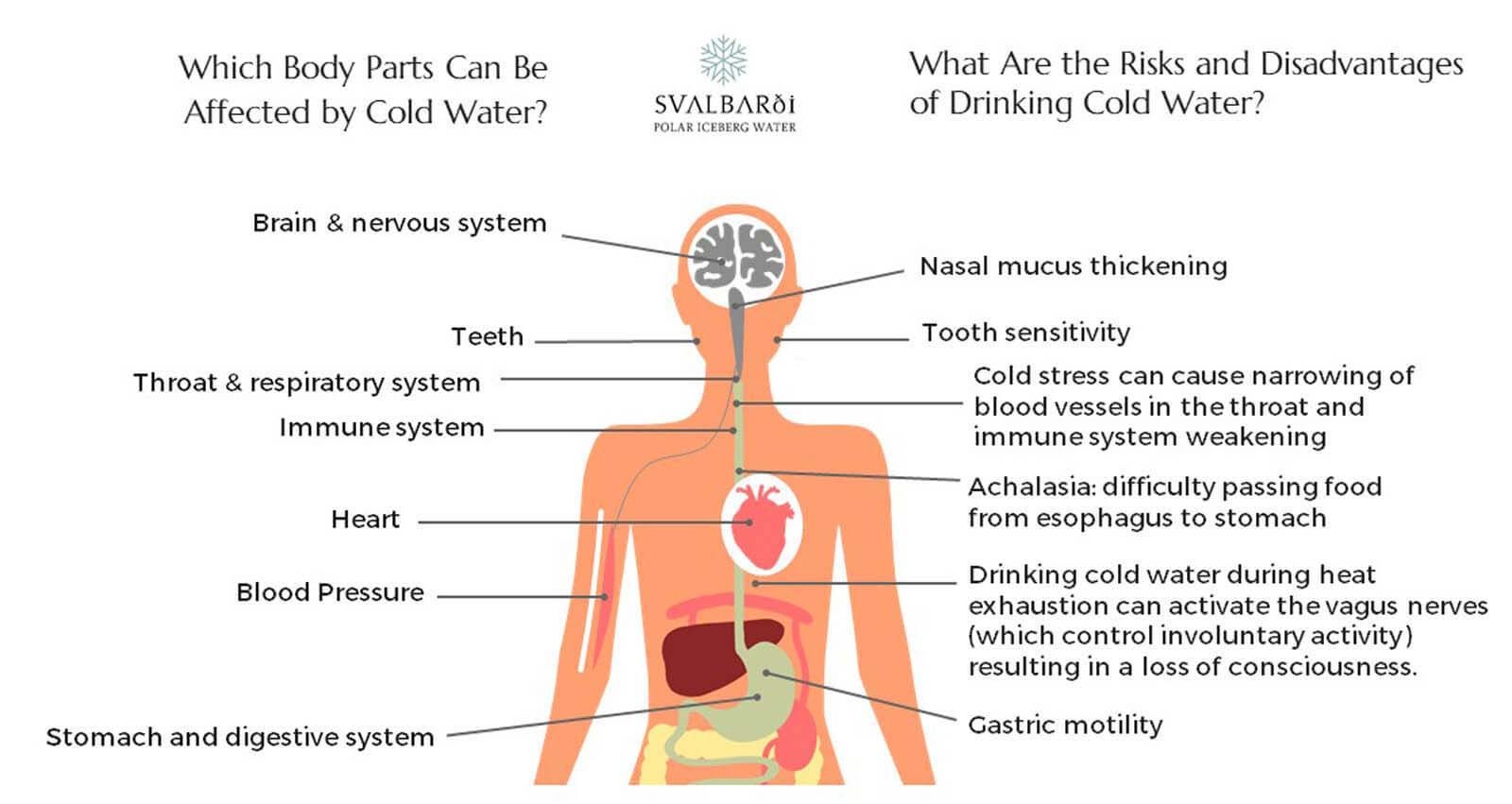
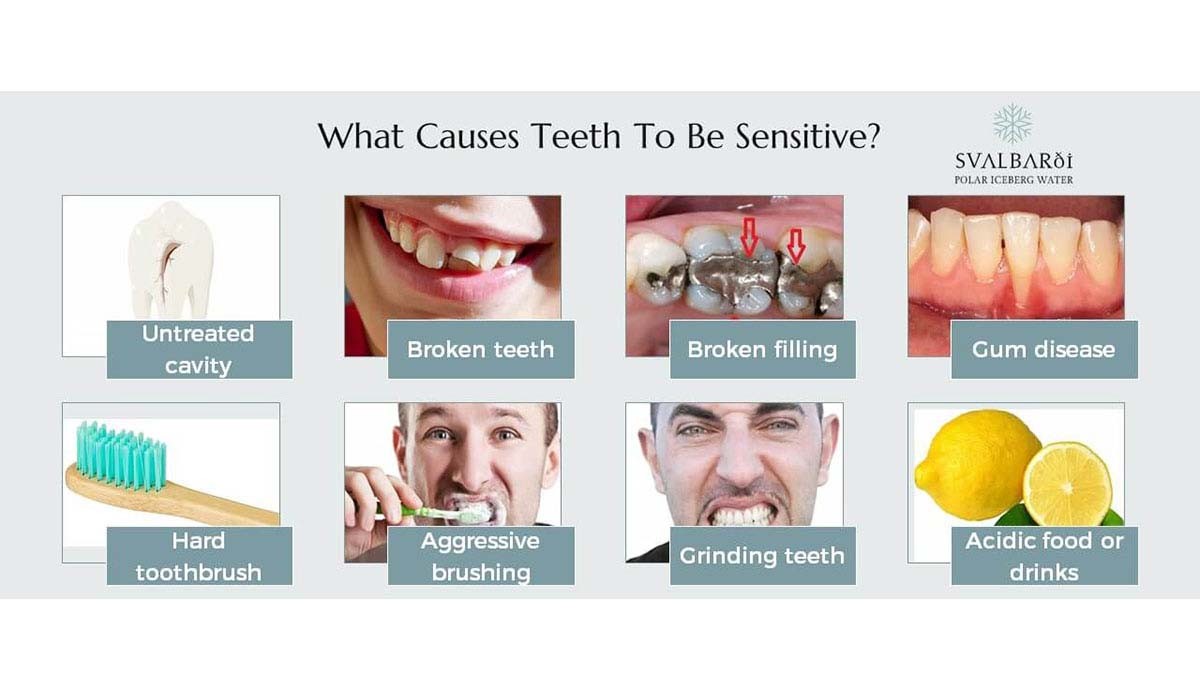
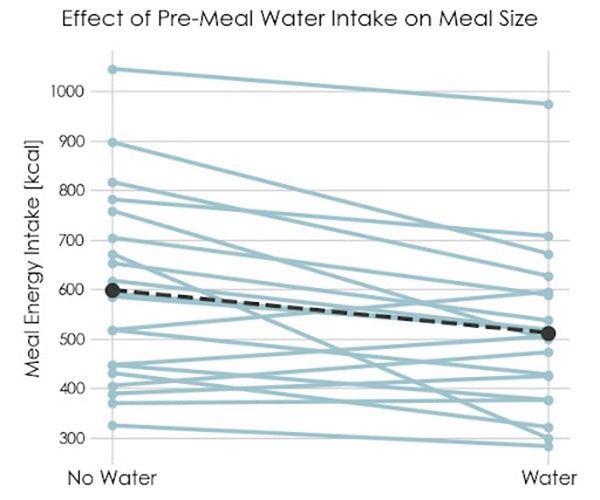
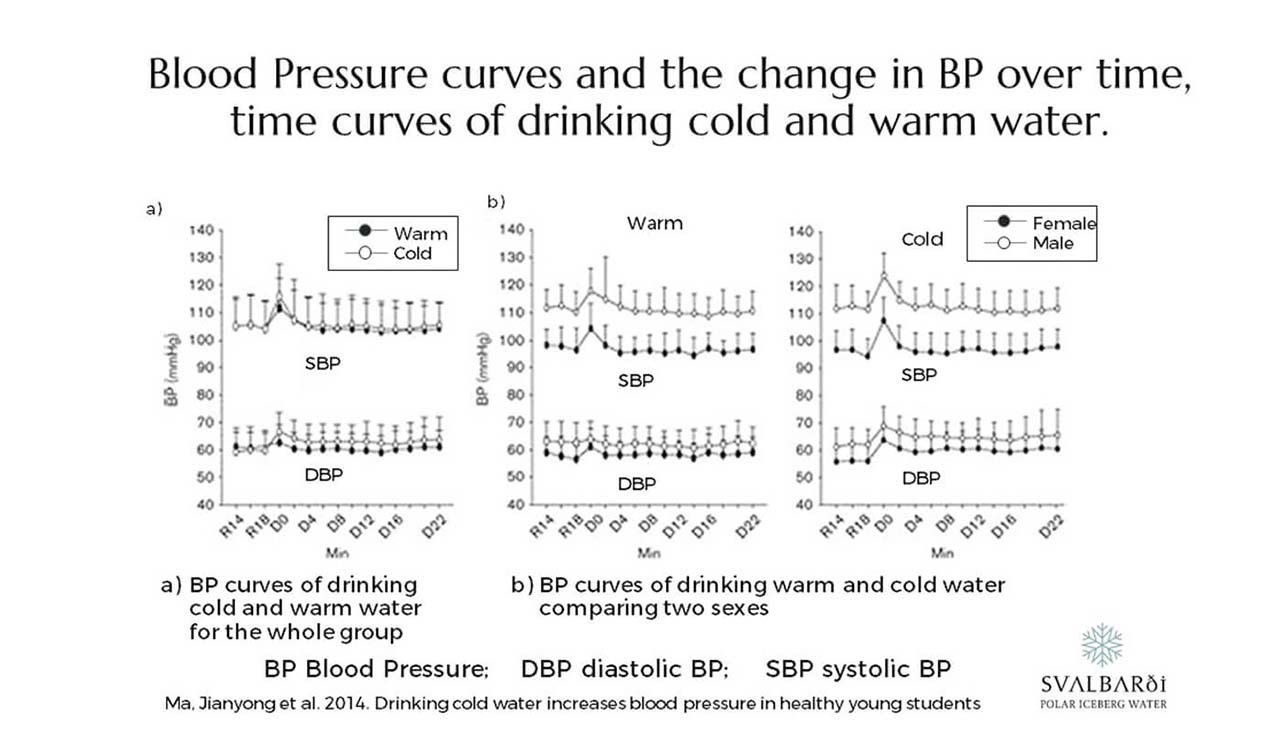
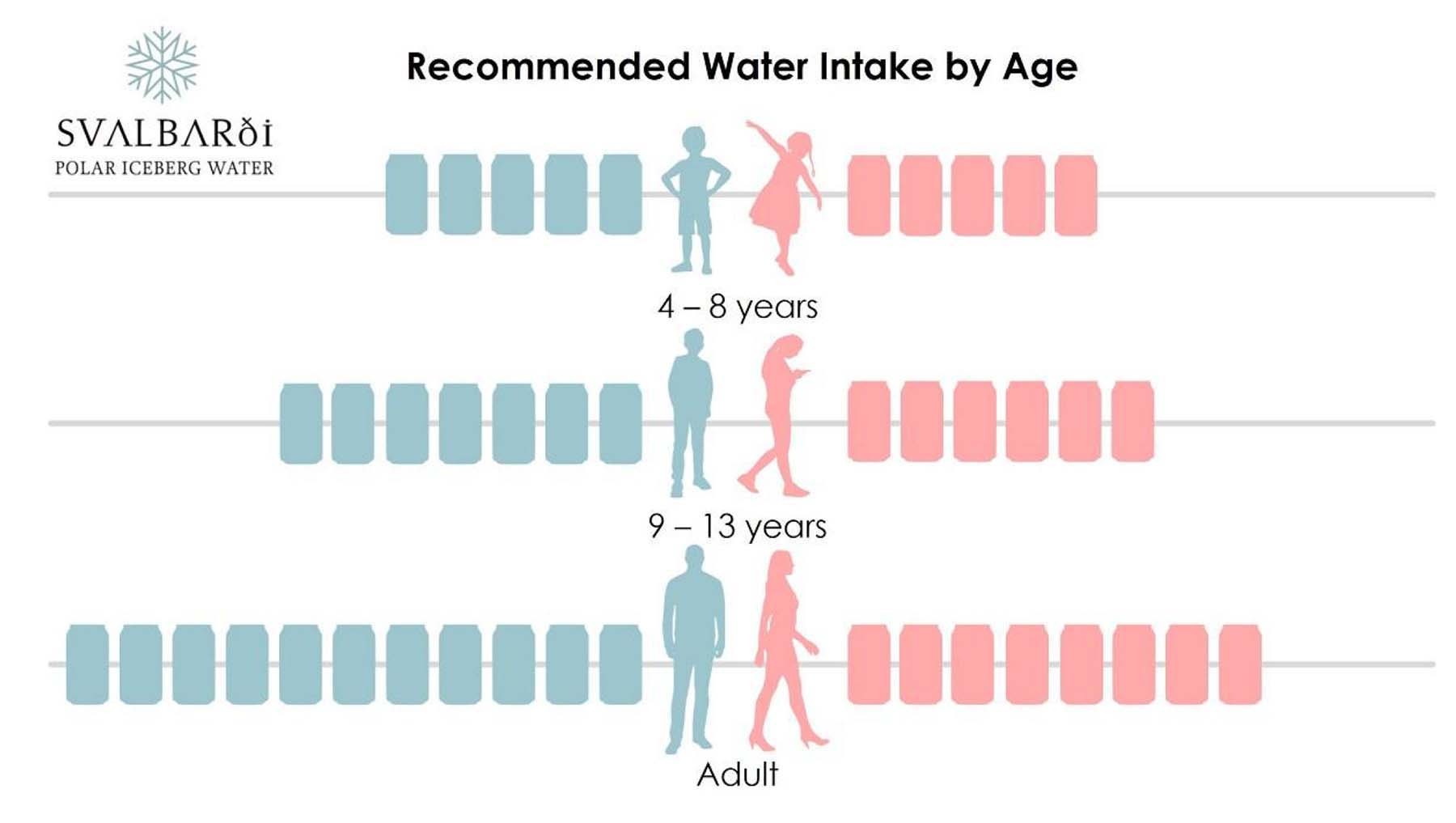
9. Addressing Common Misconceptions About Cold Water and Health
There are several common misconceptions surrounding cold water and its effects on health. Let’s debunk some of the most prevalent ones:
- Myth: Drinking cold water causes colds.
- Fact: Colds are caused by viruses, not by water temperature. While cold water might temporarily affect nasal mucus, it doesn’t directly lead to a cold.
- Myth: Cold water shocks your system.
- Fact: For most healthy individuals, cold water is unlikely to cause a significant shock. Your body is generally well-equipped to regulate its temperature.
- Myth: Cold water is bad for digestion.
- Fact: While cold water might temporarily slow gastric emptying, there’s no strong evidence that it significantly impairs digestion.
- Myth: You shouldn’t drink cold water after exercising.
- Fact: Cold water can actually be beneficial after exercise, helping to cool your body and improve hydration.
- Myth: Warm water is always better for you than cold water.
- Fact: The ideal water temperature depends on the situation and personal preference. Both warm and cold water have their own potential benefits and drawbacks.
10. Seeking Expert Guidance and Resources for Further Information
For personalized advice regarding water temperature and hydration, consult with your doctor or a registered dietitian. They can assess your individual health needs and provide tailored recommendations.
Here are some additional resources for further reading:
- National Academies of Sciences, Engineering, and Medicine: For general guidelines on water intake.
- Journal of Sports Science and Medicine: For research on hydration and exercise.
- American Dental Association: For information on tooth sensitivity.
- World Health Organization (WHO): For global health guidelines on water and hydration.
- Centers for Disease Control and Prevention (CDC): For health information and recommendations.
Understanding the nuances of cold water consumption empowers you to make informed decisions about your health and hydration.
Do you have more questions about cold water and its effects on your health? The experts at WHY.EDU.VN are here to help. Visit our website at why.edu.vn, call us at +1 (213) 555-0101, or stop by our office at 101 Curiosity Lane, Answer Town, CA 90210, United States to get your questions answered today.
Frequently Asked Questions (FAQ) About Drinking Cold Water
Here are some common questions related to drinking cold water, along with concise answers:
- Does cold water burn more calories? Yes, the body uses energy to warm cold water, potentially burning a few extra calories. However, the effect is relatively small.
- Is cold water bad for your throat? For some, cold water might temporarily irritate the throat or thicken mucus. It is generally only a concern for babies and elderly people with weakened immune systems.
- Can cold water cause stomach cramps? In some individuals, cold water might contribute to stomach cramps or discomfort, particularly after exercise.
- Is it okay to drink cold water during a fever? Cold water can sometimes help to temporarily lower body temperature during a fever and improve hydration.
- Does cold water help with weight loss? Drinking cold water may support weight loss by boosting metabolism and promoting fullness, but it’s not a magic bullet.
- Can cold water make you sick? Cold water itself doesn’t cause illness. Colds and other infections are caused by viruses or bacteria.
- Is cold water bad for your sinuses? Cold water might temporarily thicken nasal mucus, but it doesn’t generally harm your sinuses.
- Does drinking cold water affect your blood pressure? Some studies suggest that cold water might temporarily raise blood pressure.
- Is cold water good for hydration? Yes, cold water can be a refreshing and effective way to stay hydrated.
- Can cold water damage your teeth? Cold water can exacerbate tooth sensitivity in individuals with pre-existing dental problems.